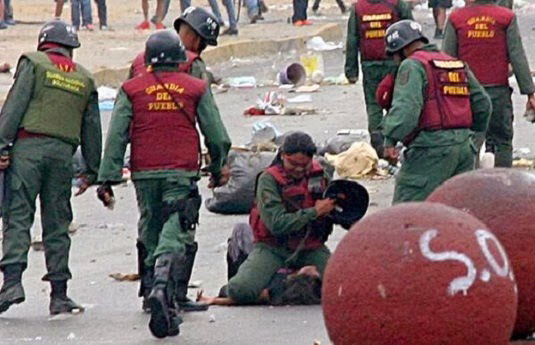
May 17, 2017 | News
La CIJ condena enérgicamente la violenta represión de las manifestaciones por parte del Gobierno venezolano y sus cuerpos de seguridad, así como el juzgamiento de civiles por tribunales militares de ese país.
Entre el 4 de abril y el 16 de mayo de 2017, han fallecido de manera violenta más de 40 personas en el contexto de manifestaciones, por la acción de los cuerpos de seguridad del Estado venezolano y grupos armados de civiles afectos al Gobierno.
Asimismo, centenares de personas han sido detenidas arbitrariamente, muchas de las cuales han sido trasladadas a prisiones militares, instalaciones de organismos de seguridad o a cárceles de máxima seguridad.
Numerosos detenidos han denunciado golpizas, tratos crueles e inhumanos así como actos de tortura.
Igualmente, por lo menos 275 civiles están procesados por tribunales militares, acusados de delitos previstos en el Código Militar, como los de “rebelión” y “traición”.
En muchos casos, a los abogados defensores se les limita el acceso a las salas de audiencia, sólo están autorizados a hablar uno pocos minutos antes de las audiencias con sus defendidos y se les restringe el acceso al expediente penal.
La CIJ recuerda que todas estas prácticas vulneran derechos y libertades fundamentales y constituyen una violación flagrante por parte del Estado venezolano de sus obligaciones constitucionales e internacionales de garantizar y proteger los derechos humanos.
Desde hace varios años la CIJ ha venido siguiendo la situación en Venezuela y ha podido constatar el vertiginoso y sistemático deterioro de los derechos humanos y de las libertades fundamentales, la pérdida de independencia del Poder judicial y, en general, el ocaso del Estado de Derecho.
Al respecto ver los informes de la CIJ: Fortaleciendo el Estado de Derecho en Venezuela (2014) y Venezuela: el ocaso del Estado de Derecho (2015).
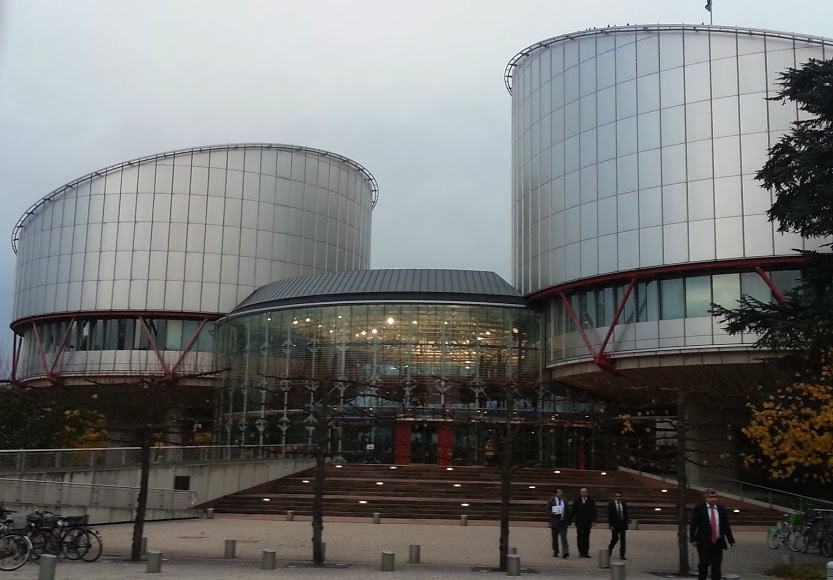
Apr 6, 2017
The ICJ has intervened before the European Court of Human Rights in a case of alleged abduction of a Tajik national and transfer to his country of origin where he could be at risk of torture or ill-treatment.
The International Commission of Jurists (ICJ) intervened in the case of K.F. v. Russia. K.F. had been subject to a procedure of extradition to Tajikistan to answer for terrorism-related offences there. The procedure was stalled by the interim measures issued by the European Court of Human Rights in the case. On the day of his release, for the expiry of the maximum term for detention, he disappeared. The family informed his lawyer that he was being held in a remand prison in Tajikistan.
In this submission, the ICJ provided the Court with an analysis, based on international law sources, of the positive obligations of States parties to the European Convention to ensure that no transfer is carried out of persons subject to interim measures enjoining such transfer by the European Court. The submission includes a comparative analysis of the law, jurisprudence and practice of other regional human rights systems. The ICJ also assessed the capacity of the Russian legal system to protect against transfers in violation of the Convention rights and, in particular, of the interim measures of the Court.
The ICJ concluded that the Russian authorities have not yet provided an effective protection programme that would ensure the respect of the interim measures of the European Court in cases of alleged abductions. Furthermore, the ICJ pointed out that the lack of any effective investigations and public condemnation of practices of abduction is detrimental to the effective implementation of the Court’s interim measures.
The ICJ submitted that this continued lack of compliance by Russian authorities with the rulings of the European Court affects the whole system of compliance with interim measures. The recurrence of this situation, therefore, requires the formulation of specific measures to enhance systemic changes in Russian law and practice.
Russianfederation-KF_v_Russia-ECtHR-amicus-ICJ-final-eng-2017 (download the third party intervention)
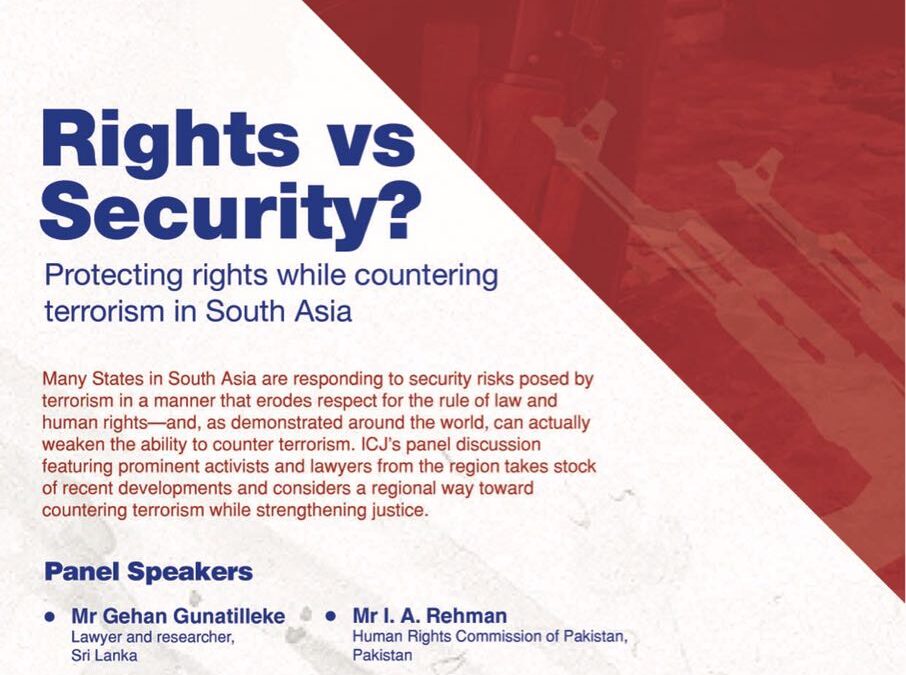
Mar 13, 2017 | Events, News
The ICJ and the Human Rights Commission of Pakistan are convening a side event at the UN Human Rights Council, entitled “Rights vs Security? Protecting human rights while countering terrorism in South Asia”.
The event takes place 15 March 2017, 12:00-13:00, Palais des Nations, Room XXI
Many States in South Asia are responding to security risks posed by terrorism in a manner that erodes respect for the rule of law and human rights—and, as demonstrated around the world, can actually weaken the ability to counter terrorism. ICJ’s panel discussion featuring prominent activists and lawyers from the region takes stock of recent developments and considers a regional way toward countering terrorism while strengthening justice.
Panelists:
Mr I. A. Rehman: Human Rights Commission of Pakistan (Pakistan)
Mr Adilur Rahman Khan: Odhikar (Bangladesh)
Mr Gehan Gunatilleke: Lawyer and researcher (Sri Lanka)
Ms Sanhita Ambast: Human rights lawyer (India)
Moderator:
Mr Massimo Frigo: International Commission of Jurists
A flyer may be downloaded here.
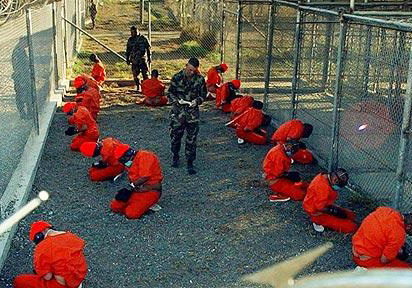
Jan 26, 2017 | News
The ICJ deplores comments made last night by the United States President Donald Trump, expressing approval for the practice of torture in counter-terrorism operations.
The ICJ is also alarmed at reports that the US administration is considering resurrecting the most abusive policies and practices during the early 2000s, including prolonged arbitrary detention in CIA-administered secret “black site” facilities, enforced disappearance, and rendition to other countries for torture and ill-treatment.
“These practices of torturing detainees and ‘disappearing’ them in black sites are serious crimes which must never be repeated,” said Ian Seiderman, ICJ Legal and Policy Director.
“Even President Bush, despite his administration’s appalling record, publicly denounced torture as being against the laws and values of the United States,” he added.
Contact:
Ian Seiderman, ICJ Legal and Policy Director, t: +41 22 979 3837 ; e: ian.seiderman(a)icj.org
Background:
During an interview on US television last night, President Trump repeated his support for torture practices such as waterboarding (near-drowning) and declared that “torture works.”
A number of media reports have indicated that the Trump Administration may issue an Executive Order to review “whether to reinitiate a program of interrogation of high-value alien terrorists to be operated outside the United States” and whether the CIA should be in charge of such a programme.
Counter-terrorism abuses during the Bush administration from 2001-08 involving torture, enforced disappearance, secret detention and rendition were widely condemned as unlawful, morally unacceptable, and ineffective, both internationally and in the US, leading to the abandonment of such practices.
A report by the Eminent Jurists Panel of the ICJ on Terrorism, Counter-terrorism and Human Rights, issued in 2009 conducted after a four-year study concluded that “such practices are not a legitimate response to the threat of terrorism. Such practices are not only inconsistent with established principles of international law, and undermine the values on which free and democratic societies are based, but as the lessons of history show, they put the possibility of short term gains from illegal actions, above the more enduring long term harm that they cause.”
The Obama administration definitively abolished the practices of torture and secret detention upon taking office in 2009, although they had already been substantially wound down in the later years of the second Bush administration.
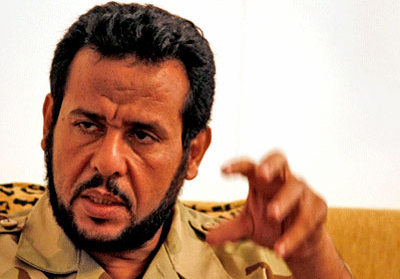
Jan 17, 2017 | News
Leading human rights organizations, including the ICJ, have hailed a landmark decision of the UK Supreme Court to hold the UK Government accountable for its role in human rights abuses overseas.
The country’s highest court issued today a long-awaited judgment in the two joined appeals in Belhaj and Others v. Jack Straw & Others and Rahmatullah v. Ministry of Defence and Another.
The Court ruled that the UK Government could not rely on the legal doctrines of sovereign immunity and foreign act of state to escape claims in the two cases alleging UK involvement in breaches of human rights by foreign governments.
The first case, brought by the former Libyan opposition leader Abdul-Hakim Belhaj (photo) and his wife, Fatima Boudchar, alleges that UK Government officials were complicit in the couple’s kidnap and rendition to Gaddafi’s Libya, where they were arbitrarily imprisoned and tortured.
The second case was brought by Yunus Rahmatullah, who was detained by UK forces in Iraq before being handed over to US forces and allegedly tortured and imprisoned without charge for over ten years.
The Government argued before the Supreme Court that the claimants’ cases should be dismissed because, under the doctrines of sovereign immunity and foreign act of state, the UK courts were not permitted to rule on the legality of acts by foreign governments.
The claimants argued in response that the doctrines only applied in certain limited situations, and that they did not extend to the circumstances in Belhaj and Rahmatullah.
The claimants’ position in Belhaj was supported by several prominent human rights organizations – the ICJ, Amnesty International, JUSTICE and REDRESS – who intervened in the case.
The intervening organizations submitted that dismissing the claims would effectively grant impunity for torture to UK officials, violating international human rights law and weakening international commitments to an effective remedy for torture and other ill-treatment, enforced disappearance, arbitrary detention and other human rights breaches.
The Supreme Court found unanimously in favour of the claimants and dismissed the Government’s appeal.
It ruled that the doctrine of sovereign immunity did not apply because the foreign governments were not parties to the cases and their legal interests were not affected by the claims put forward.
In respect of foreign act of state, while the judges differed in their reasoning, they agreed that the doctrine could not be invoked for such serious violations of law as torture, unlawful detention and enforced disappearance.
The Belhaj and Rahmatullah cases will now proceed to full trials, where the courts will examine the facts of the claims and determine whether the UK Government and its officials were complicit in the claimants’ torture and other human rights abuses.
“The UK Supreme Court has spoken forcefully in affirming that the public interest in ensuring access to justice for victims of serious human rights abuses is paramount,” said Ian Seiderman, ICJ Legal and Policy Director.
“Human rights are universal and their effective enforcement must not be blocked by misapplied juridical doctrine that contrives to deny victims a remedy,” he added.
Contact
Ian Seiderman, ICJ Legal and Policy Director, t: +41 22979 3800 ; e: ian.seiderman(a)icj.org
UK-Belhaj case-News-press releases-2017-ENG (full version of press release, in PDF)









